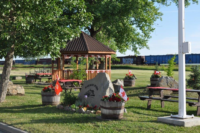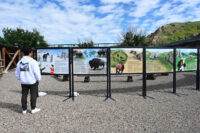How are fax machines like coal mines?
By Lethbridge Herald Opinon on September 3, 2020.
Province making
a mistake to invest
in the past
Stephen Legault
Recently Premier Jason Kenney and his Minister of Environment, Jason Nixon, announced that they would be removing restrictions on the development of fax machines, explaining that while much of the world has long since made the transition to email or cloud-based computing, there is still a role for facsimile transmission devices and while that market is rapidly diminishing, the premier has said that the last fax machine used should be manufactured here in Alberta.
That announcement hasn’t happened, of course, but something even more ridiculous has: the Alberta Coal Policy, in place since 1976, has been tossed out, opening the door for mountain-top removal and open-pit coal mining in Alberta’s water tower, the Eastern Slopes.
Had the premier and his minister actually announced their faith in the future of fax machines to boost Alberta’s economy, the pundits and even some UCP supporters would light their hair on fire, arguing that such investments in yesterday’s technology was short-sighted and that we should be investing in the future rather than the past. Instead, there has been a smattering of applause from the sidelines and a rousing endorsement from Australian-owned companies planning on strip-mining Alberta’s sensitive headwaters around the Crowsnest Pass.
There is indeed still a market for steel-making coal and likely will be for some time. Despite recent oversupply problems in China due to lower demand for coking or metallurgical coal due to COVID-19-related slowdowns in global steel production, the outlook according to market watchers is fair. One market forecast suggests growth in demand for metallurgical coal will increase by two per cent over the next three to four years, adding more than $14 billion to the value of the industry in that time period.
So, how is it that metallurgical coal is like the fax machine? That market is on shaky ground. Just as the fax machine wasn’t about the tech itself, but the function it provided, met coal is about firing the furnaces that make steel, and soon there will be cleaner, less-polluting and possibly cheaper ways to make that product.
According to the International Energy Association (EIA), the world’s first carbon-free steel will be available by 2026, thanks to a quantum leap in the development of hydrogen-powered steel-making technology. Combined with innovations in carbon capture and storage (CCS) hydrogen is poised to be the cloud-based computing to metallurgical coal’s fax machine. While the UCP government doesn’t want to acknowledge it, the world is rapidly seeking de-carbonization solutions and the market for one of the worst polluting substances in the world – coal – may last a few more years, or even a decade, but its time is rapidly coming to an end.
Where will this leave Alberta? In the dust; in thick black clouds of coal dust, to be precise. Rather than investing in new, innovative clean technologies that the world will need tomorrow, our current batch of political leaders is intent on driving our prosperity into the ground for short-term political gain. The UCP cut tax credits that encouraged innovation and instead committed billions of taxpayer dollars to an oilsands mine that was doomed to failure. That boondoggle in the rear-view mirror, they are now opening some of the most sensitive, ecologically rich and economically sustainable landscapes in the province to mining practices that should be left in that same rear-view mirror.
People need jobs, and they need a sense of self-worth that comes with good work that helps improve the province of Alberta and their own prospects for a healthy, happy life. Rather than betting on yesterday’s faltering economy, Alberta could be leaders in developing tomorrow’s promising opportunities. Innovators in clean technology and for the corresponding capture of greenhouse gas emissions from the methane produced are right here in Alberta!
Hard-working Albertans in communities such as the Crowsnest Pass and Pincher Creek could have the jobs of the future if the province simply shifted its regulatory and financial support to the road ahead, rather than the one behind us. Instead, Jason Kenney and his team double down on the past, and in doing so are giving false hope that we’ll have anything more than a handful of jobs for a handful of years and then little to show for it except denuded rivers, gaping holes in the side of our mountains and more lost opportunities.
Stephen Legault is a strategy and communications consultant, author and photographer living in Canmore, and a frequent visitor to southwestern Alberta. His book “Earth and Sky: Photographs and Stories from Alberta and Montana,” from Rocky Mountain Books, is a celebration of the region.
17-16




